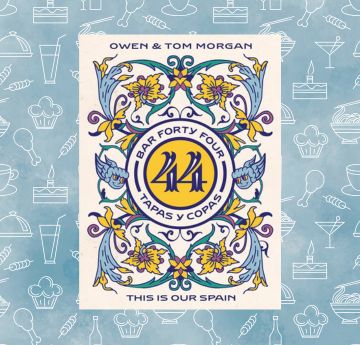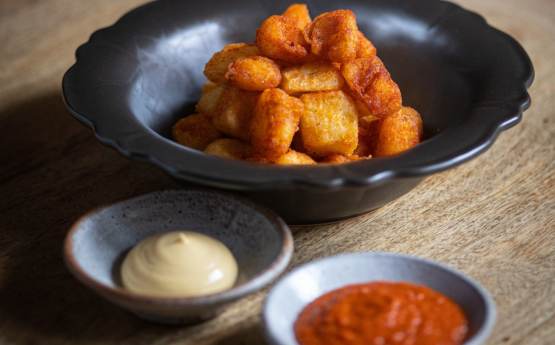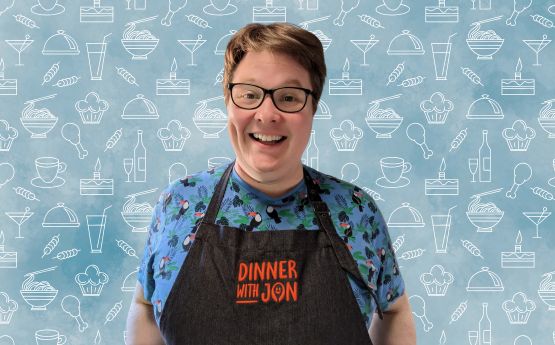Owen Morgan - Chef, Restaurateur
BSc Geography. Class of 2002

Owen Morgan. BSc Geography, Class of 2002
What made you come to Swansea University in the first place?
Swansea was a big draw because I’m from Cardiff in The Vale. I left Wales because of sport to study in Bristol. But, when it came to choosing university courses, I was always drawn back to Wales. Growing up, when I wasn't traveling in Spain with my parents, we'd always be down in the Gower, and I had lots of friends there. Plus, I knew Swansea was a really strong university for my course, so it was always my first choice, on application.
What were your go to spots then for food and drinks, not just in Swansea, but just on campus in general as well?
We would go to The Mumbles. Back in, the late nineties, there were still at least a dozen pubs on the mile. So, there was always something going on. There were also a couple of little bistros in The Mumbles as well when we could afford to go out and do things like that. And I think in town, there was, Wind Street. That was already a big thing back then. Back then, the Kingsway had a lot more going on though. There was a Portuguese/Spanish place, Eleo’s Brasserie, which was sort of an occasion place that you would go to. I was also part of the Balti Society, the student Curry Club. Which was lovely. There was a run of curry houses that started on St Helen's Road going in towards town. I don't know if it's still like that. Every month, we'd have, a dinner in one of them, and we had different agreements with the people who ran the restaurants, and they would do a deal for us. There used to be between thirty and fifty of us on a night out!
What about the food in Fulton House?
I used to eat on campus most days. I was in Lewis Jones, in my first year. So, you would be in Fulton House and in the canteen for breakfast in the morning. In my second year, I was in Brynmill so it's sort of varied after that.
So, could you tell us a bit more about your career since you left Swansea?
I would say, a lot a lot of guys who I know now, certainly in this sector, didn't really plan to go into it, which I guess in The UK is often the way. We often berate The UK in the hospitality sector because it's not seen as a career path necessarily. Whereas on the continent, Spain, France, Italy, it's very much a respected career and you can, you know, spend a lifetime in it. My brother and I had finished university, we were looking at graduate jobs, looking at moving away, but then my sister ended up moving back to Wales to open a restaurant. She had a career in hospitality and had studied hospitality in university and was very successful in London. She wanted to open a restaurant in our hometown of Cowbridge. So, it was one family Friday night dinner, around the kitchen table with a bottle of wine. We were discussing it, and her husband suggested we look at the derelict social club, a conservative club in the town, which had been boarded up. So, we went to look at it, and with our love of Spain and spanish food, we thought we'll do something different. It was a market town of four or five thousand people, classic British market town with one street. It had lots of classic pubs, maybe one restaurant in the town which probably hadn’t changed much in twenty or thirty years. So, it's very much like that, we thought we'd do something a bit different, a bit more modern.
Would you say just going to those bistros as a student kind of influenced you to enter this industry?
It definitely did! It became passionate about food as a student. I think the people who lived with me, certainly in the second or third years got a taste of it. I was obsessed with food. I would always be bringing stuff back to our house in Brynmill. We would always have a house meal once a week, and I would generally cook it. So, I was I was into it then, but I had also had great experiences with food while travelling with my family to Spain and France and other places as well.
You started out with one restaurant but now you are in multiple locations. How would you say the brand has evolved over the years?
That's an interesting one. We started as Bar 44 but now we’re called the Forty-Four group. We've got different brands within the group umbrella. But it's a weird one when I speak to people often in London or in Spain that we work with. They often ask why we are called forty-four? It’s because the original social club we took over in Cowbridge was at number 44 on the high street. But it always bugged us a bit. We were so passionate, and we were evolving our product, of modern Spanish food and drink, over the years and really trying to educate the South Wales public into a more in-depth level of what it can entail. However, the people who pass us by on the street, they see a name like Bar forty-four, and it doesn't really scream Spain, it doesn't scream anything like that. So, when we eventually looked to expand to our second site, it took us nearly ten years. We canvassed a lot of local people around Penarth.
They said, listen, you've already grown a reputation for your food and drink and people know the name. That was about twelve years ago, when we thought, right, we're sticking with this. Whatever we do with 44 we'll make it known to be Spanish. we also went to a design and branding agency to refresh it all in terms of, the ethos, the logo, the fonts, every one of the touch points within the bars and restaurants became a lot clearer in its identity. So even though it's Bar forty-four or Asador forty-four or whatever it might be, it was a lot more recognisable in in terms of the brand. After that, came things like our first book published a few years ago, which went on to be a best-seller. It was all about our story as a family and two brothers in particular, and our travels around Spain and our influences in food and drink.
So, I think that was a big marker in terms of the brand and brand presence if anyone asks, we can point them towards that as well. So, it gave us more identity, I think.
Would you say that all your travels to Spain inspired you to go with Spanish Food?
I think so. My mum, and my sister were big influences. My sister is equal director with me and my brother. From a very young age, we were a cooking family, we would cook together and sit and eat and chat. Something that's been lost in British culture over decades is the joy of families eating together on a regular basis, on a weekly basis, sitting around a big table. Or it doesn't have to be a table, wherever, but just sitting and enjoying what you've cooked from scratch, and just talking about your day, your week, and things like that.
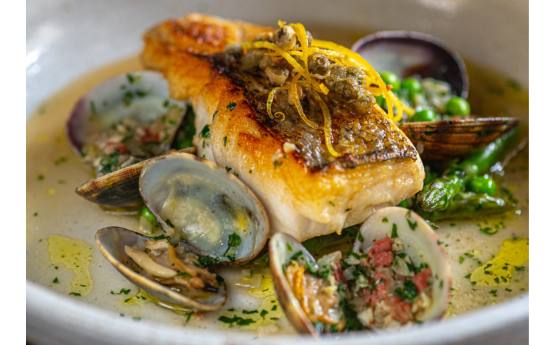
There was a love of that from us, but also, I think one of my first memories from was when I was about five, we got in a camper van and our parents were traipsing us around Spain in the holidays, but not the parts of Spain where you have a laminated menu of photos of food. It was the inland and mountains in Spain and areas like that that gave us influence. And then when we opened the first bar, I continued the traveling, but more in a professional sense of me going to work in kitchens in the most bizarre parts of Spain, and also into London kitchens to learn the craft.
If you could bring any food from Spain to every restaurant in Wales, what would it be?
Oh, that's a tough one. I mean, to be honest, before Brexit, we used to use 90 percent high end Spanish produce. Since Brexit, it's become a lot more difficult, especially importing ourselves. So, we combine, and it's always been a thing for us to combine seasonal Welsh, produce, especially the perishable side of things, such as, daily fish and meat and seasonal veg. But key Spanish produce is still at the heart of what we do, and it's probably got some of the world's most iconic ingredients.
If I had to pick one, it would probably be the best Iberico ham. When are you looking at something like Jamon, you pay for what you what you get, essentially. So, the very top grade, pure breed of Iberico pigs that have been cured for four to five years, hanging in the cellars, and had a minimum of 10,000 square meters for each pig to graze on. It's up there with the finest black truffles and the best caviar and things like that. I think it's just undeniably Spain when you eat it. No other cured ham in the world really comes close to those black pigs.
You appeared on BBC’s Saturday Kitchen. How did that opportunity come about?
That was really good, actually. I’ve done it four or five times now. I had an opportunity before that, during COVID to do Sunday Brunch on Channel Four. I had to do it remotely from upstairs in Asador 44 where we've opened a small boutique hotel. We did it on Zoom, and I did a drinks section. I think someone from Saturday Kitchen saw that and inquired about me. So that was the first opportunity was to go on the BBC.
The Ukraine war had just started, late 2022. And at the time, they were still talking a lot about cost-of-living crisis and particularly the energy crisis. So, they gave me a brief straight away that it had to be sort of modest ingredients that you could find anywhere and something that was quick and easy that didn't take a lot of gas or electric to cook. It went well and luckily, I’m sort of semi-regular on there now.
It looks like good fun
It is. It's hard work, but it is worth it because it really does help. You come off air, and I ring my brother and he's like, yeah, the bookings are coming in. So, it does work. They get you down there the day before, to go through everything on set. And then they send for you at, half five in the morning on a Saturday. Then you do a full run through. And then you get ready to go again for 10:00 to do it live.
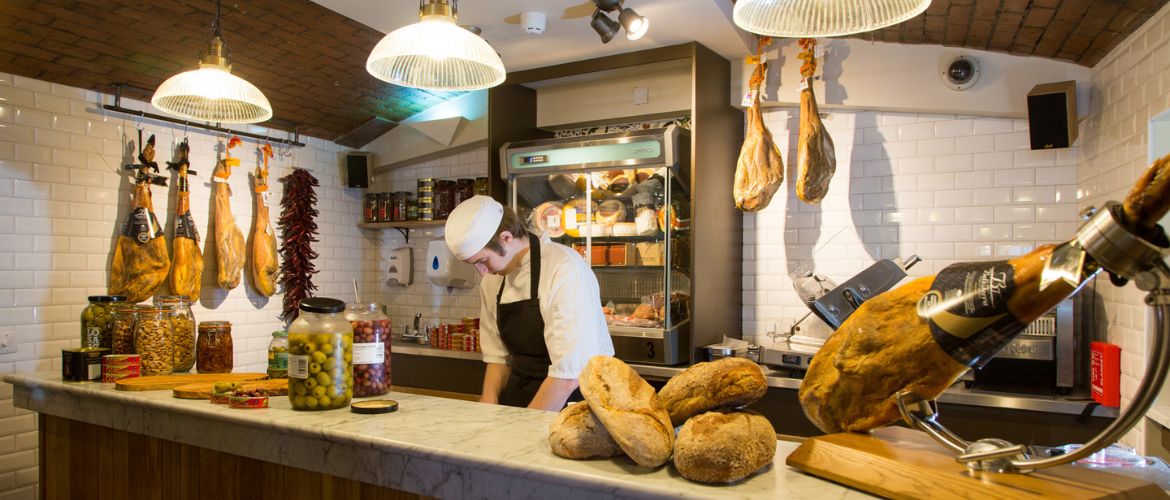
You mentioned your first TV appearance was about drinks and your social media handle is sherry monster. Tell us a bit about that?
It was Sherrymonster44. It stems from my first trip to, the Sherry Triangle in Sapin. It was going back sixteen, seventeen years now, I was with a member of staff who came over to Cowbridge, who wanted to come over to improve his English. He worked in the kitchen with me for eighteen months, doing all sorts of menial things. He never said a word. He just got on with all the work and was amazing. Then he invited me back to his house in Spain for a holiday and I went over and picked me up when I arrived.
The first place we went to, was a sherry bodega. It turned out to be his! And I was like, what's going on? The bodega is one of the biggest in the region, called Osborne. They are a major sherry producer, and he was part of the family. I had no idea. He had no reason to work basic jobs in the kitchen, money was not an issue for him. But he never said a word. He was deep cleaning fryers and floors with me, and it was amazing. So, it was a visit to that winery that started it. We always served sherry because it was Spanish tapas bar and what you should do, but I wasn't sort of deeply involved. But from then, I became obsessed with sherry. I started visiting the region multiple times a year, I visited different wineries and then I got accepted into the International Sherry educators’ course in 2013. They have 20 people a year from around the world they accept on a week-long course. You have to do a blind tasting and exam at the end and all that sort of stuff. So I did that. And then I started, teaching, about Spanish wine and sherry around the UK for trade, restaurant teams, and things like that. And then I started representing a couple of brands in an ambassador role. So going to wine fairs, doing tastings with the trade and then the consumer.
Sherry then became a huge thing in Bar Forty-four. We started serving it from the barrel, and there was a big revolution in the UK with sherry, and in places like New York and Sydney, in bars and restaurants. It's been a big thing. So, it's always been part of my DNA, if you like, the sherry thing. There’s even there's even a chapter in the book about it. I really enjoy talking to people about sherry and teaching them about it. If I hadn't had opened Bar Forty-Four, I may have gone into teaching.
What would you say is the key to finding a wine that perfectly complements tapas?
That's a big one. You know, tapas are a is a whole cuisine, really. So, it very much depends on what you're looking for. Again, fish, meat, veg, just like white fish or shellfish, game, things like that. So, it's just about finding a profile of a wine, whether it be sherry, whether it be white, red, rose, sparkling. There's something for every ingredient and every dish. You know, big flavoured simple things on the bar like, I don't know, grilled chorizo or something like that, which has got paprika spice and porkiness to it. You want a nice red wine that can sort of fill your boots and not be over overpowered, or a dry sherry or something like that.
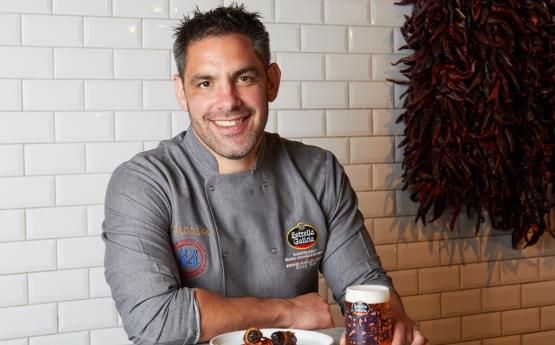
You mentioned that you have travelled around Spain quite a lot. Which area is your favourite for food?
That's really difficult. I spend a lot of time in Andalusia in the South, in the sherry towns in Cadiz. So almost overlooking Africa and Morocco really. And the wines coincide with a lot of food. This is where the red tuna run through the Gibraltar Straits every May, and it's a big thing. But, historically, the North of Spain has been a powerhouse culinary wise, and all your gastronomy and high-end restaurants are in the Basque Country, and Catalonia.
But equally, we use a lot of beef and seafood from Galicia in the Northwest, which it’s very reminiscent of Wales because it rains a lot. Quite mountainous, very green, and amazing coastlines. So it’s got that natural pantry from land and sea which is brilliant, and it has brilliant wines. Next to that, Asturias in the Picos Mountains is another big area with amazing seafoods. You could be on the beach one minute, and within half an hour, you could be up a mountain. And they have amazing cheeses, seafood, dairy, meats, and things like that. There is so much choice it’s hard to choose a favourite.
If you could eat just one dish for rest of your life, what would it be?
My one weakness ingredient wise is generally shellfish, but I would go for amazing prawns. I just absolutely can't get enough of them. But not anything farmed in Thailand or Vietnam that don't taste of anything, but wild Mediterranean prawns. They just taste of sweet, sweet sea, like, the essence of the sea, even raw or just boiled or different prawns we'd have on the grill depending on the profile of them and then use the shells and the heads to make a bisque, which you could use for a seafood stew or even a rice dish. Delicious.
Final question then. Joe's or Verdi's?
Good question. That's hard, isn't it?... Joe's ice cream

